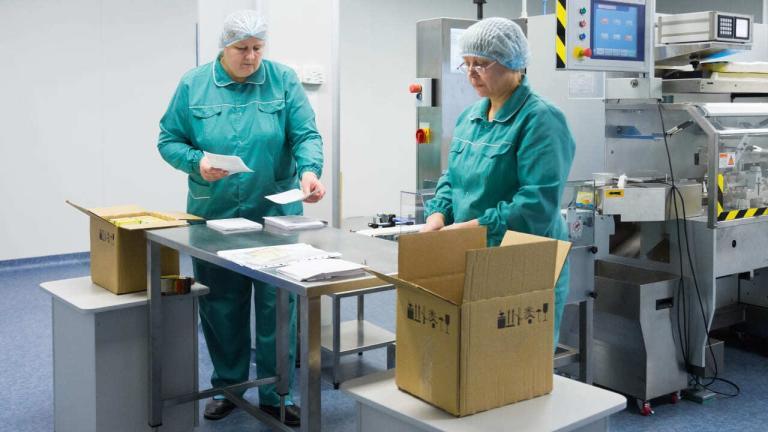
Contract Development and Manufacturing Organizations (CDMOs) play a major role in supporting drug development and production processes.
A CDMO, short for Contract Development and Manufacturing Organization, is a company that provides services ranging from formulation development to manufacturing for pharmaceutical and biotechnology companies.
The importance of selecting the right CDMO cannot be overstated, particularly when it comes to late-phase clinical trials. Late-phase trials are vital stages in the drug development process, where the efficacy and safety of a potential drug are rigorously evaluated.
Therefore, choosing a competent and reliable CDMO partner is essential to ensure the success of these trials, as well as the eventual commercialization of the product. In this article, we will understand the critical factors that pharmaceutical companies should consider when selecting a CDMO for their late-phase clinical trials.
Introduction to Late-Phase Clinical Trials
Late-phase clinical trials, also known as Phase III trials, are a critical stage in the drug development process. These trials involve testing the safety and effectiveness of a potential drug in a larger population of patients.
Unlike earlier phases, which primarily focus on assessing safety and dosage levels, late-phase trials aim to gather comprehensive data on the drug’s efficacy compared to existing treatments or a placebo.
During late-phase trials, researchers closely monitor participants to evaluate the drug’s performance in treating the targeted disease or condition. This phase typically involves randomized and controlled studies conducted across multiple clinical sites to ensure the reliability and validity of the results.
The findings from late-phase trials significantly influence regulatory decisions regarding the drug’s approval for market release.
Significance of Late-Phase Trials in the Drug Development Process
Late-phase clinical trials play a vital role in the drug development process due to several key reasons:
1. Efficacy Assessment: Late-phase trials offer vital insights into how well a drug works in treating the targeted disease or condition. These trials provide substantial evidence that is crucial for regulatory approval. Positive results from late-phase trials are often necessary to demonstrate the effectiveness of the drug.
2. Safety Confirmation: While earlier phases primarily focus on assessing safety, late-phase trials continue to monitor safety aspects but in a larger and more diverse patient population. This extensive evaluation helps to confirm the drug’s safety profile and identify any potential adverse effects that may occur less frequently but are still significant.
3. Market Approval: Regulatory agencies, such as the FDA in the United States or the EMA in Europe, heavily rely on data from late-phase trials to evaluate the benefits and risks of a drug. Approval from these agencies is a crucial step in making the drug available to patients. Late-phase trials provide the necessary data to support the approval process and ensure the drug’s marketability.
4. Commercialization Preparation: Positive results from late-phase trials not only pave the way for regulatory approval but also assist in preparing for commercialization. Pharmaceutical companies can leverage the data gathered from these trials to develop effective marketing strategies, establish appropriate pricing, and plan for the scale-up of production to meet anticipated market demand. This preparation is vital for a successful launch of the drug into the market.
Factors to Consider When Choosing a CDMO for Late-Phase Clinical Trials
Let us now discuss the major factors that play a critical role in selecting the right CDMO for late-phase clinical trials. From ensuring comprehensive services to mitigating risks, these considerations collectively contribute to the success of drug development initiatives.
By prioritizing transparency, quality, experience, regulatory compliance, capacity, and risk management, pharmaceutical companies can make informed decisions and forge productive partnerships with CDMOs.
Here are the factors to keep in mind when choosing CDMO for late-phase clinical trials:
1. Services Offered by the CDMO
When selecting a CDMO for late-phase clinical trials, it’s essential to assess the range of services they offer. A comprehensive CDMO should provide end-to-end solutions, including:
- Formulation Development: Evaluation of drug formulations for stability, efficacy, and safety.
- Analytical Testing: Comprehensive analysis of drug compounds for quality assurance and regulatory compliance.
- Manufacturing: Scalable production of drug products under current Good Manufacturing Practices (cGMP) standards.
- Packaging: Design and implementation of packaging solutions suitable for late-phase clinical trials and commercialization.
- Distribution: Coordination of logistics for timely delivery of clinical supplies to trial sites.
- Integrated Solutions: Offering end-to-end services to simplify the drug development process and ensure a seamless transition from late-phase trials to commercial launch.
2. Transparency in Cost and Project Management
Transparency in cost and project management is paramount for a successful partnership with a CDMO. Pharmaceutical companies need to have a clear understanding of the financial implications and timelines associated with their projects.
A reliable CDMO should provide detailed cost estimates, transparent pricing models, and regular updates on project progress. This transparency fosters trust and enables effective decision-making throughout the collaboration.
3. Quality and Reliability of the CDMO’s Services
Quality and reliability are non-negotiable factors when choosing a CDMO for late-phase trials. The CDMO should adhere to stringent quality standards, such as Good Manufacturing Practices (GMP), to ensure the safety, efficacy, and consistency of the drug product.
Additionally, reliability in meeting project deadlines and delivering high-quality results is crucial for maintaining momentum in the drug development process.
4. Track Record and Experience in Managing Late-Phase Trials
Experience and a proven track record in managing late-phase trials are indicators of a CDMO’s competence and reliability. Pharmaceutical companies should thoroughly evaluate the CDMO’s past projects, paying particular attention to their success in navigating late-phase trials and obtaining regulatory approvals.
Partnering with an experienced CDMO minimizes risks and increases the likelihood of achieving positive outcomes in clinical development.
5. Understanding of Regulatory Requirements
Dealing with regulatory requirements is a complex aspect of late-phase clinical trials, requiring in-depth knowledge and expertise. They should demonstrate a commitment to compliance and possess the capabilities to support regulatory submissions and inspections throughout the drug development process.
6. Capacity and Resources Available
The capacity and resources available at the CDMO’s facilities directly impact their ability to meet project requirements and timelines. Pharmaceutical companies should assess the CDMO’s infrastructure, equipment, and personnel to ensure they can accommodate the scale and complexity of late-phase trials.
Adequate capacity safeguards against delays and ensures seamless execution of development and manufacturing activities.
7. Risks Associated with Partnering with a CDMO
While partnering with a CDMO offers numerous benefits, it also entails inherent risks that must be carefully considered. Risks may include delays in project timelines, unexpected costs, quality issues, and regulatory challenges.
Pharmaceutical companies should conduct thorough risk assessments and establish contingency plans to mitigate these risks effectively.
Steps to Assess and Select a CDMO for Late-Phase Clinical Trials
Given below are the steps to assess and select a CDMO for late-phase clinical trials:
Conducting Thorough Research and Due Diligence
Before selecting a CDMO for late-phase clinical trials, it’s essential to conduct thorough research and due diligence. This involves:
1. Defining Requirements: Clearly outline the specific needs and objectives of the project, including timeline, budget, and desired services.
2. Identifying Potential CDMOs: Research and compile a list of potential CDMO partners that align with the project requirements. This can be done through online searches, industry referrals, and attending conferences or networking events.
3. Reviewing Credentials: Evaluate the credentials and reputations of potential CDMOs, including their track record, experience, and client testimonials. Look for CDMOs with a proven history of success in managing late-phase trials and commercialization.
4. Conducting Site Visits: Visit the facilities of shortlisted CDMOs to assess their capabilities, infrastructure, and quality systems firsthand. This allows for a deeper understanding of their operations and culture.
5. Checking References: Reach out to past and current clients of the CDMOs to gather feedback on their experiences. Ask about their satisfaction with the services provided, adherence to timelines, and overall performance.
Evaluating Potential CDMO Partners Based on Given Factors
Once potential CDMO partners have been identified, they should be evaluated based on the factors outlined earlier, including:
1. Services Offered: Assess whether the CDMO offers the necessary services to support late-phase clinical trials and commercial production.
2. Transparency: Evaluate the CDMO’s transparency in cost estimation, project management, and communication.
3. Quality and Reliability: Review the CDMO’s quality systems, certifications, and track record for delivering high-quality and reliable services.
4. Track Record and Experience: Consider the CDMO’s experience in managing late-phase trials and their success rate in achieving regulatory approvals.
5. Understanding of Regulatory Requirements: Ensure that the CDMO has a thorough understanding of regulatory requirements and a proven ability to navigate regulatory challenges.
6. Capacity and Resources: Assess whether the CDMO has the capacity and resources to accommodate the scale and complexity of the project.
7. Risks: Identify and evaluate potential risks associated with partnering with each CDMO, including project delays, quality issues, and regulatory compliance.
Engaging in Discussions and Negotiations with Shortlisted CDMOs
After evaluating potential CDMO partners, engage in discussions and negotiations with the shortlisted candidates. This involves:
1. Requesting Proposals: Request detailed proposals from each CDMO, outlining their proposed approach, timelines, costs, and terms of engagement.
2. Clarifying Expectations: Communicate your expectations and requirements to each CDMO, including project objectives, deliverables, and milestones.
3. Addressing Concerns: Discuss any concerns or questions you may have with each CDMO and seek clarification on key issues.
4. Negotiating Terms: Negotiate terms and conditions with each CDMO, including pricing, payment schedules, intellectual property rights, and confidentiality agreements.
Making a Well-Informed Decision Based on the Evaluation Process
Finally, make a well-informed decision based on the evaluation process and discussions with each CDMO. Consider factors such as:
1. Alignment with Project Requirements: Choose the CDMO that best aligns with the project requirements, objectives, and budget constraints.
2. Reputation and References: Consider the reputation and references of each CDMO, as well as feedback from past clients.
3. Confidence and Trust: Select a CDMO that instils confidence and trust through transparent communication, reliability, and expertise.
4. Long-Term Partnership Potential: Assess the potential for a long-term partnership with the chosen CDMO, considering factors such as compatibility, scalability, and future needs.
By following these steps and considering the outlined factors, pharmaceutical companies can effectively assess and select the right CDMO partner for their late-phase clinical trials.
Final Words
Selecting the right CDMO for late-phase clinical trials is a critical decision that requires careful consideration and thorough evaluation. By prioritizing factors such as services offered, transparency, quality, experience, regulatory compliance, capacity, and risk management, pharmaceutical companies can mitigate risks and increase the likelihood of success in drug development.
Engaging in a diligent research process, evaluating potential CDMO partners, and conducting meaningful discussions and negotiations are essential steps in making a well-informed decision.
Ultimately, choosing a CDMO that aligns with project requirements, instils confidence, and fosters trust lays the foundation for a successful partnership and the eventual commercialization of innovative therapies.




